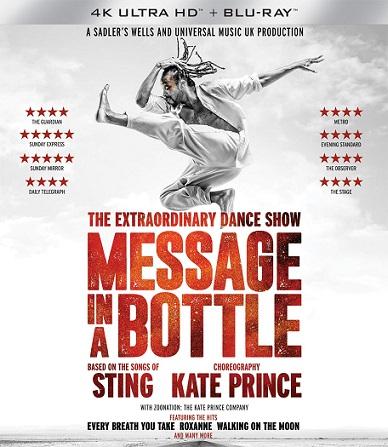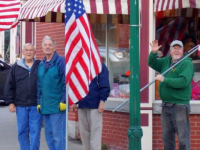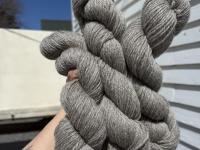Sting’s music set to dance, Dead’s Blues reaches 50
Sting and ZooNation: The Kate Prince Company: Message in a Bottle (Mercury Studios/Universal, 4K Ultra HD disc + Blu-ray, NR, 88 min.). This engaging dance production, filmed at London’s Sadler's Wells Theatre, is set to 27 songs of 17-time Grammy Award-winner Sting and choreographed by Kate Prince. The show, which includes no dialogue, is an imagined story about one displaced family of five, and a universal tale of survival, hope and love. After Bebko village, alive with joyous celebrations, is suddenly under siege, the family is among those displaced and imprisoned. Determined and daring, three parted siblings – two men, Leto and Mati, and one woman, Tana -- step out on their own extraordinary adventures.
The varied dance moves, often incorporating hip-hop styles, including jumps and turns, are very appealing, as is the minimalistic staging, which includes a holding cell consisting of just a movable frame, without actual walls. The songs “Every Breath You Take,” “Roxanne,” “Every Little Thing She Does Is Magic” and “Fields of Gold” have new arrangements by Alex Lacamoire (“Hamilton,” “Dear Evan Hansen”), recorded by Sting and guest artists, including Olivier Award-winner Beverley Knight, who sings lead on three tracks. Other guest leads are by Lynvol Golding, Claudia Georgette, Shaneeka Simon and Christella Litras.
Through the menu, a viewer can go directly to the portion of the show with any one of the songs.
The film opens with the printed messaged: “Refugees are mothers, fathers, sisters, brothers, children with the same hopes and ambitions as us – except that a twist of fate has bound their lives to a global refugee crisis on an unprecedented scale.”
Except for the guards, all the dancers are barefoot throughout the show. It is nice hearing Sting’s song, mostly sung by him, but they do not always have an exact matchup with the scenes being presented. One that does strongly is “Roxanne,” as one of the freed brothers goes to a sex club and dances with a woman. They end up kissing. The sister joins a dance group and the other brother falls in love with a guy. The latter duo’s dancing, both together and with a group, is a highlight.
Other, earlier highlights include when masked men attack the imprisoned village women and, during “Shadows in the Rain,” when there is a riot by the detainees.
The show has toured the United Kingdom, extensively in Europe and completed a 10-stop tour of North America in spring 2024. Prince’s renowned narrative choreography previously includes West End theatrical hits “Some Like It Hip Hop,” “Into the Hoods” and “Everybody’s Talking About Jamie.” Grade: Production film A-
Grateful Dead: Blues for Allah 50th Anniversary Deluxe Edition (Rhino/dead.net, 3 CDs). The album (44:54), the Dead’s eighth studio album and 12th overall, was recorded between February and May 1975 during the band’s extended hiatus from touring. Recorded at rhythm guitarist/vocalist Bob Weir’s home studio, its music further showcases the jazz fusion influence shown on the band's previous two records, 1973’s “Wake of the Flood” and 1974’s “From the Mars Hotel.” It also had a more experimental sound, influenced by Middle Eastern scales and musical styles, which also is reflected in the album's lyrics. Thus, it melded new styles and increased emphasis on jamming and improvisation in comparison with the band's other studio efforts.
This release contains a remaster of the original album by Grammy Award-winning engineer David Glasser, sourced from the original analog tapes with speed correction and tape restoration by Plangent Processes; two discs of live bonus versions; and a 20-page booklet with black-and-white photos and writing by Nicholas G. Meriweather and David Lemieux.
Rather than their usual approach of recording studio versions of songs that had matured on stage, the tracks were developed in the studio. According to manager Rock Scully, this was an attempt by lead guitarist Jerry Garcia to have more involvement in the writing process by other band members. This enabled the band to progress beyond its previous genres.
During the writing and recording of the album, the Middle Eastern theme emerged, supported by Robert Hunter’s lyrics. Non-Western time signatures were used on some of the material, as well as experiments with instrumentation, such as flute on the Bach-inspired "Sage & Spirit" (named for Scully's daughters).
According to bassist Phil Lesh, "Jerry brought in a strange, almost atonal melodic entity that would evolve into the title song and sequence for the album, and I had sketched out a little Latin-flavored, seven-beat instrumental number inspired by Shelley's poem ‘Ozymandias” called ‘King Solomon’s Marbles.’”
Besides “Crazy Fingers,” Lesh said, Garcia also contributed “a triptych of already-written tunes in ‘Help on the Way,’ ‘Slipknot’ and ‘Franklin's Tower’ that became, in live performance, one of our finest exploratory vehicles. Bob had a beautiful guitar instrumental, 'Sage and Spirit,' and one of his stompin’-est self-congratulatory rockers, 'Music Never Stopped,' to round out the album."
The main riff of "Franklin's Tower" was partly inspired by the chorus of Lou Reed’s 1973 hit “Walk on the Wild Side.”
Upon release, “Blues for Allah” became the band's highest-charting album up to that point, peaking at No. 12 in the United Staes during a 13-week chart run and becoming their third straight Top 20 album. Two singles were released to promote the album: the non-album “The Music Never Stopped,” included here in a live version," and "Franklin's Tower."
Percussionist Mickey Hart, who had sat in at the band's "farewell" concert on Oct. 20, 1974, was invited to the sessions by Garcia and Lesh. Hart had left the band in February 1971. He contributed to the songwriting of "King Solomon's Marbles" and played occasional percussion parts, including the recording of crickets heard on the three-part title suite. Following the release of the album, Hart was officially reinstated as a band member shortly before the group resumed touring in 1976. (In 1974, no one knew if the band would continue, hence the “farewell” show.)
Along with contributing as a background singer, Donna Godchaux was a co-vocalist on "The Music Never Stopped" and the vocal sections of the title suite. The guest flutist was Steve Schuster, a former equipment manager for Quicksilver Messenger Service who also played saxophone in the Keith & Donna Band.
The front cover artwork features an iconic image of a frizzy-haired, fiddling skeleton, wearing a crimson thwab and sunglasses, sitting in the window of an ancient rock wall. The work, titled "The Fiddler," was painted in the summer of 1974 by Philip Garris, who was awarded both the gold medal and the Award of Merit from the Society of Illustrators.
Unusual for a Grateful Dead album are the number of instrumentals, which include "Slipknot!," both parts of "King Solomon's Marbles," "Sage & Spirit" and the "Sand Castles and Glass Camels" section of "Blues for Allah." The nearly structureless title suite that closes the album was performed three times in 1975 and then retired, while several other songs, specifically "Crazy Fingers," "The Music Never Stopped" and the "Help on the Way-Slipknot!-Franklin's Tower" sequence (the last section of which often was played separately) were performed regularly for the rest of the Dead's career.
The other two discs of this edition (almost 2 hours) include nine tracks from a soundcheck and rehearsal on Aug. 12, 1975 at the Great American Music Hall in San Francisco, five songs from the March 23, 1975 concert at Kezar Stadium in San Francisco, and eight songs from the June 21 and 22, 1976 shows at the Tower Theater in Upper Darby, Pennsylvania. Grade: Box set B+
Kool and the Gang: Greatest Hits (Mercury/UMe, CD). This 12-song collection celebrates the 75th year of the R&B, soul and funk band that was formed in Jersey City, N.J. in 1964. Its founding members include brothers Robert “Kool” Bell and Ronald Bell (also known as "Khalis Bayyan"), Dennis “Dee Tee” Thomas, Robert "Spike" Mickens, Charles Smith, George Brown, Woodrow "Woody" Sparrow and Ricky Westfield. They have undergone numerous changes in personnel and have explored many musical styles throughout their history, but the brothers continue with the group.
Of the 12 tracks, six are presented in their single versions. Only two tracks appear here that were not in their 1999 release, the 21-track “The Very Best of Kool and the Gang.” Those two are the disco-ish “Open Sesame – Pt. 1” and the slow, bit jazzy instrumental “Summer Madness.”
Their fourth album had the group make its mark with the U.S. Top-10 singles “Jungle Boogie” and “Hollywood Swinging,” both included here. Their second commercial peak was between 1979 and 1986, when singer James “J.T.” Taylor was added. The period yielded the hit singles “Ladies Night” (1979), “Too Hot” (1979), the U.S. No. 1 “Celebration” (1980), “Get Down on It” (1981), “Joanna” (1983), “Misled” (1984) and “Cherish” (1985), all included here. The latter is a ballad with chorus vocals.
The group was inducted into the Rock and Roll Hall of Fame in 2024. Grade: CD A
WAR: The CD Collection 1971-1975 (Rhino, 5 CDs). Fresh off their Hollywood Walk of Fame Ceremony, WAR Celebrates 50 Years of “Why Can’t We Be Friends?” and 55 Years as a band with this new 5-CD box set, featuring the five groundbreaking albums they made after parting ways with Eric Burdon. A previous box set, released in March, covered those three albums on four discs.
The collection features the albums “WAR” (1971), “All Day Music” (1971), “The World Is a Ghetto” (1972), “Deliver the Word” (1973) and “Why Can’t We Be Friends?” (1975). The albums mark the creative emergence of WAR as a singular force in American music as they fused funk, jazz, Latin rhythms, soul, rock and psychedelia into a genre-defying sound all their own.
Housed in a striking package with original artwork by acclaimed illustrator Dave Van Patten, with his surreal, hand-drawn style, each album delivers the most vibrant and immersive listening experience to date. Among the well-known tracks are “All Day Music,” “Get Down,” “Nappy Head” (the theme from “Ghetto Man”), “Slippin’ into Darkness,” “The Cisco Kid,” “The World Is a Ghetto,” “Gypsy Man,” “Me and Baby Brother,” “Deliver the Word,” “Low Rider” and “Why Can’t We Be Friends?” Grade: Box set A
About this blog:

My music review column, Playback, first ran in February 1972 in The Herald newspapers of Paddock Publications in Arlington Heights, IL. It moved to The Camden Herald in 1977 and to The Courier Gazette in 1978, where it was joined by my home video reviews in 1993. The columns ran on VillageSoup for awhile, but now have this new home. I worked at the Courier Gazette for 29 years, half that time as Sports Editor. Recently, I was a selectman in Owls Head for nine years.



























